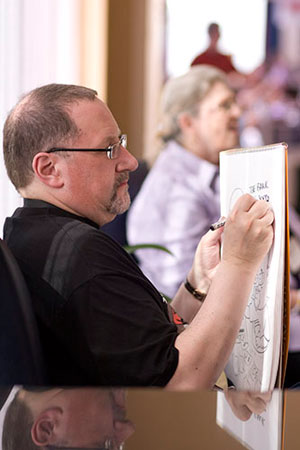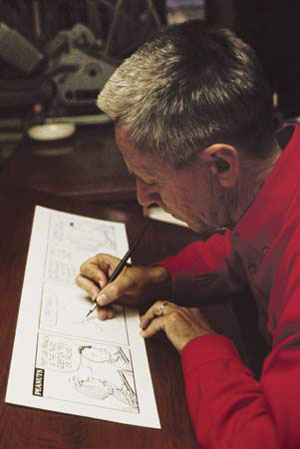Cartoonist
Tasks & duties

Cartoonists may do some or all of the following:
-
follow briefs from clients
-
create characters, stories or jokes
-
use stencils to make sketches in pencil
-
go over sketches with ink to make a final copy
-
create and recreate cartoons on a computer for manipulation
-
give the final copy to a newspaper, publisher or client
-
draw and sell cartoons for special occasions such as birthdays
-
provide entertainment by drawing cartoons at special events
-
teach cartooning
Specialisations
Cartoonists may specialise in the following areas:
Caricaturist
Caricaturists draw pictures of people with exaggerated physical and personality traits.
Comic Strip Cartoonist
Comic strip cartoonists create multi-panel, sequential comic strips that stand alone or are put into book form.
Gag Cartoonist
Gag cartoonists publish single-frame gags that are not political or satirical.
Political Cartoonist
Political cartoonists publish political or social satire in cartoon form, in a single-frame or comic strip format.
Skills & knowledge

Cartoonists need to have:
-
drawing and design skills
-
an understanding of their markets, such as newspapers or magazines
-
good general knowledge and awareness of current issues and events
-
writing skills
-
knowledge of computers, especially if they use computer software to produce their cartoons
-
knowledge of the printing methods used by their clients
-
business and time management skills
Entry requirements
There are no specific entry requirements to become a cartoonist. However, a portfolio of artwork or cartoons, or a website displaying your work may be useful to show prospective clients your level of ability and versatility.
Secondary education
There are no specific secondary educational requirements, but English, art, history and social science are useful.
Tertiary education
A course in cartooning or design may be helpful.
Training on the job
Many skills are gained on the job. Cartoonists travel around New Zealand or overseas to further their training and skills by attending workshops and conferences.
Useful experience
Useful experience for cartoonists includes:
-
artistic or creative work
-
illustration work
-
work as a journalist
-
any work on a newspaper or magazine
Related courses
Fine Arts
Graphic Arts and Design Studies
For more information, please refer to Career Services.
Document Actions
